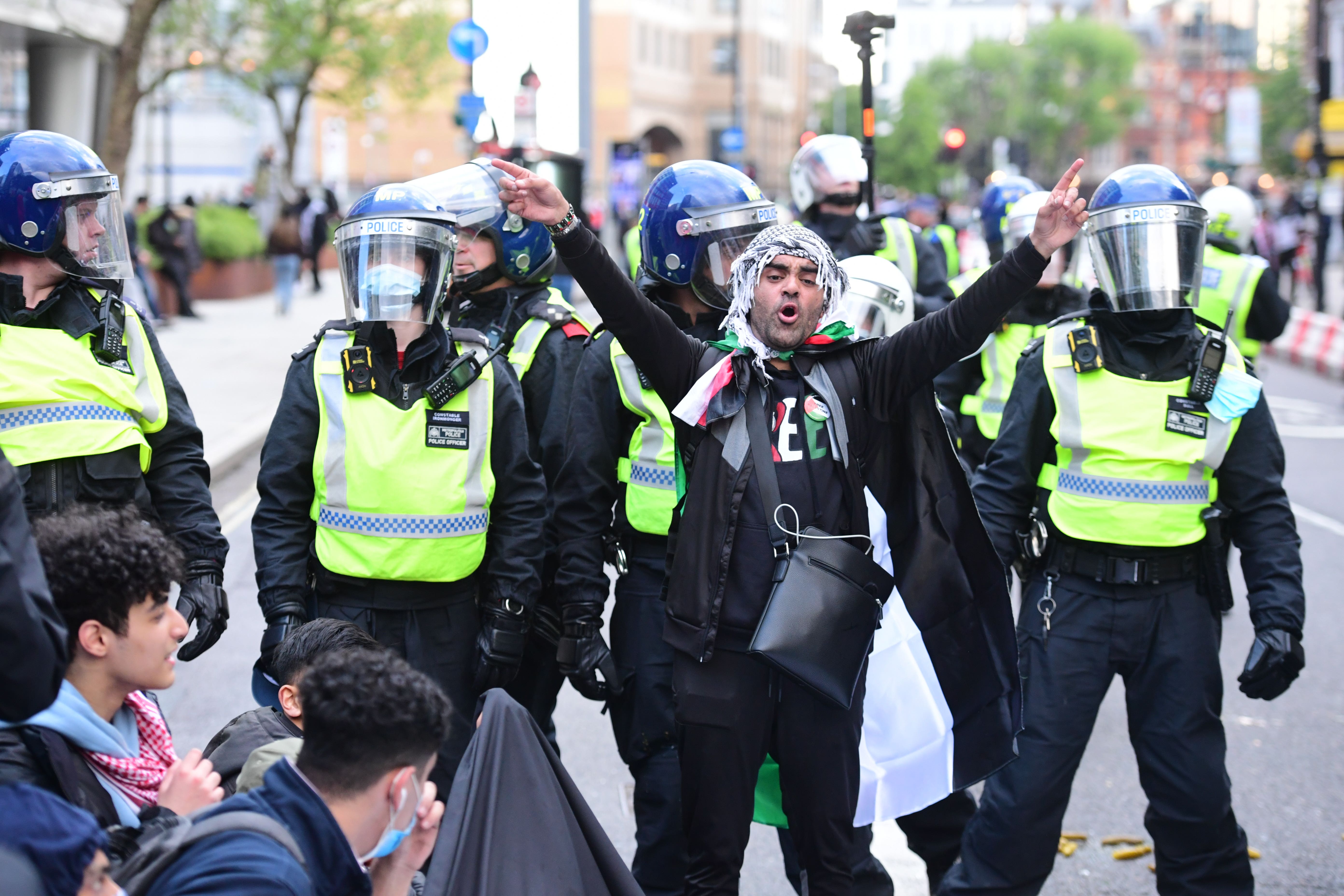Public want pro-Palestinian protests to be policed, not managed, Sunak says
The Prime Minister said officers will have the Government’s backing when they take actions at demonstrations.

Your support helps us to tell the story
From reproductive rights to climate change to Big Tech, The Independent is on the ground when the story is developing. Whether it's investigating the financials of Elon Musk's pro-Trump PAC or producing our latest documentary, 'The A Word', which shines a light on the American women fighting for reproductive rights, we know how important it is to parse out the facts from the messaging.
At such a critical moment in US history, we need reporters on the ground. Your donation allows us to keep sending journalists to speak to both sides of the story.
The Independent is trusted by Americans across the entire political spectrum. And unlike many other quality news outlets, we choose not to lock Americans out of our reporting and analysis with paywalls. We believe quality journalism should be available to everyone, paid for by those who can afford it.
Your support makes all the difference.The public want to see protests policed and not simply managed, the Prime Minister has said.
Rishi Sunak said his Government will give officers its backing when they “take action” at pro-Palestinian demonstrations.
He made the comments during a hastily arranged address outside No 10 Downing Street on Friday in which he railed against extremism and Islamism.
He said the UK’s streets had been “hijacked” by people “hostile” to British values during protests in support of a ceasefire in the Israel-Hamas war, which has raged for almost five months.
The Prime Minister on Wednesday met senior police chiefs to discuss the security situation for MPs as tensions simmer as the impact of the Middle East conflict reverberates among British communities, particularly those with a significant Muslim population.
MPs have spoken of increased levels of intimidation from pro-Palestinian supporters, including having their homes targeted by protesters.
The meeting with senior officers was held after the Home Office announced a £31 million security package to protect MPs from threats, including providing elected politicians with a dedicated police contact to liaise with over safety issues.
After the meeting, the Prime Minister warned that the UK is descending into “mob rule” and urged police they must use the powers they have or risk losing public confidence.
I say this to the police: we will back you when you take action
In an echo of that message on Friday, Mr Sunak — who in November voiced his support for banning pro-Palestinian marches during the weekend of Remembrance Day — said: “This week, I have met with senior police officers and made clear that it is the public’s expectation that they will not merely manage these protests, but police them.
“And I say this to the police: we will back you when you take action.”
The National Police Chiefs’ Council has been contacted for comment.
The Palestine Solidarity Campaign (PSC) this week told a press conference in Parliament that marches it had arranged had been subject to “politicised policing” with “unprecedented restrictions”.
In a document shared with reporters, the organisation said police had “behaved in a discriminatory and hostile manner to legal protest”.
After the Prime Minister’s latest remarks, Ben Jamal, director of the PSC, wrote on X: “So Rishi Sunak wants to deal with ‘extremists’.
“Maybe he should start with politicians, political commentators and religious leaders who support a state, on trial for genocide, in its mass slaughter, and deliberate creation of famine. Not those protesting against it.”
Ilyas Nagdee, racial justice director at Amnesty International UK, said peaceful protest in opposition to the events in Gaza “must not be conflated with extremism”.
“People are protesting because of the terrifyingly high civilian death toll in Gaza, which is still mounting inexorably, and the Government’s lack of action for an immediate ceasefire to stem the unbearable suffering,” he said.
“The threat to impose yet more restrictions on people’s right to peacefully protest is deeply worrying and suggests the Government is determined to silence those who may disagree with its policies.
“This is entirely in line with the chaotic patchwork of legislation and sweeping policing powers we have seen introduced in recent years.”
During his address to the nation, the Prime Minister set out a “new, robust framework” to “ensure that we are dealing with the root causes” of extremism.
Support for the anti-terrorism Prevent programme would be “redoubled”, he said, to “stop young minds being poisoned by extremism”.
There will be fresh demands on universities to “stop extremist activity on campus” and the Home Office will be charged with acting to “prevent people entering this country whose aim is to undermine its values”.
Home Secretary James Cleverly has instructed immigration officials to remove people on visas if they “choose to spew hate, or protest or seek to intimidate people”.
In a call for unity and stronger social cohesion, Mr Sunak said it was “not enough” for people in Britain to “live side-by-side”, adding “we must live together united by shared values and a shared commitment to this country”.